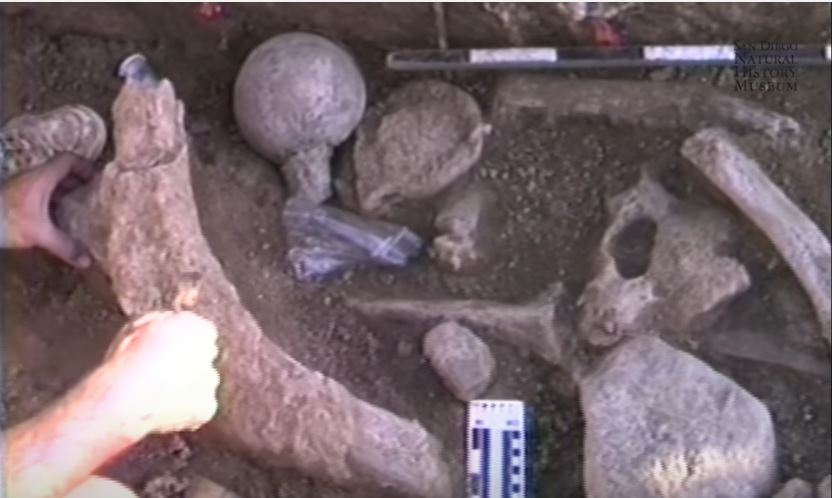A recent Nature article reported that fractured mastodon bones were recently unearthed in California, along with rocks and stone tools apparently used to break the bones to extract marrow. No human remains were found, but radioactivity analysis of the bones suggests that humans first inhabited North America more than 130,000 years ago, much earlier than archeologists had previously believed.
One archeologist called the conclusion “mind-boggling,” says a Wall Street Journal article, while another dismissed the evidence as “highly dubious.” A third said the claimed age is “extraordinary.” Indeed, if it is confirmed by discoveries at other sites, the finding would change longstanding beliefs about early human colonization of the Americas.
Archeologists involved in the dig acknowledged that their conclusion was  “surprising,” and other scientists will likely be “skeptical” about the claims, but said they’ve “made a very good case for it” and are prepared to defend their analysis.
“surprising,” and other scientists will likely be “skeptical” about the claims, but said they’ve “made a very good case for it” and are prepared to defend their analysis.
That is how science, discovery, and advancements in scientific interpretation and knowledge are supposed to work. Scientists make discoveries, present their evidence, engage in discussions and debates that can continue for years, and try to defend their conclusions. Their and past theories stand or fall on the merits, on who is best able to make a convincing case for their findings, analyses and conclusions.
Unfortunately, that is not how science has been working in the climate change arena – which is a far more critical area, due to public policy, financial, energy, employment and human rights implications.
Instead of discussion and debate, we get nasty acrimony, recriminations, accusations, refusals to share data or computer codes, and attempts to silence and punish anyone who questions the nature or degree of human influences; whether future changes will be good, bad or benign; or whether humans really can control climate and weather simply by altering the amount of carbon dioxide in Earth’s atmosphere.
Perhaps there is just too much research money out there (billions of dollars annually in recent years) for alarmist research. Or too much money at stake: $1.5 trillion a year today and an asserted need for $7.5 trillion per year for the next 15 years, to continue the biased research and replace fossil fuels with supposedly “planet friendly, sustainable” alternatives.
Maybe too many people have so much at stake (fortune, fame and careers) in trying to control energy use and economic growth, that they cannot give it up willingly. Or perhaps the same factions and forces on display at recent “marches for science and climate stability” are not ready to end their determination to banish capitalism, control the entire global economy based on climate claims, and seize and redistribute the world’s wealth and natural resources, with the marchers and their allies deciding who gets what.
The process has gone from trying to find evidence of the kind and degree of possible human influences on Earth’s climate (and weather) – to making incontestable assertions that emissions from mankind’s fossil fuel use have become the dominant or sole force driving climate change, supplanting all the powerful natural forces that controlled our planet’s climate until 50 to 100 years ago. Those forces include periodically changing energy and cosmic ray output from the sun, cloud formation, major oceanic oscillations, volcanoes, and other planetary and solar system forces.
Climatologists simply do not yet understand all the forces involved, how they work together, or how they caused massive glaciers to cover much of North America, Europe and Asia five times, and then retreat; brought Roman and Medieval Warm Periods, and a 500-year Little Ice Age to much of the world; and caused droughts that lasted many years, decades or centuries. Even the Sahara Desert was once a thriving river valley, teeming with hippos and other wildlife, and extensive evidence shows that a number of once powerful ancient civilizations were brought down by droughts.
Humanity would benefit greatly from being able to forecast climate changes years or decades in advance. But doing so requires understanding and analyzing all the forces that drive climate fluctuations. Focusing solely on carbon dioxide and other greenhouse gases will ensure that we can never predict changes accurately. The forecasting will all be garbage in, garbage out.

Excellent article, with one caveat — there have actually been hundreds of ice ages, not just 5.